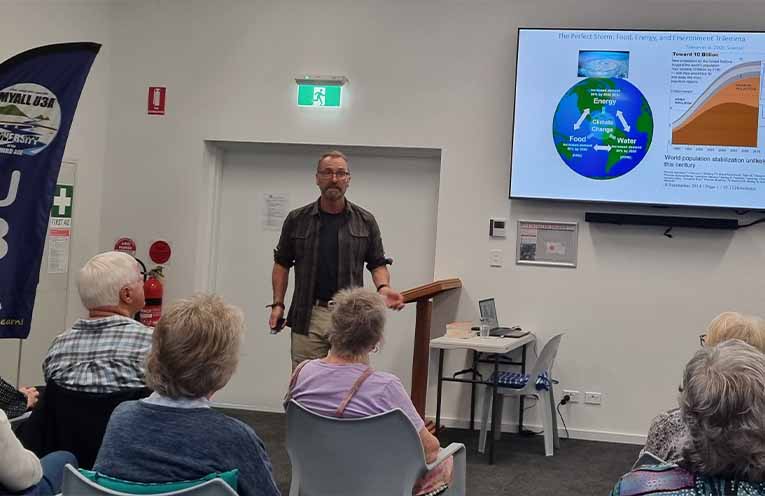ENVIRONMENTAL scientist, engineer and author Dr Paul Hardisty shared the ecological realities surrounding the Great Barrier Reef during a visit to the Myall U3A on Friday 31 October.
Originally from Canada and now based in Perth, Dr Hardisty also shared his long-held love of writing, fostered by his parents.
“Write what you know, and what you really care about,” he said, echoing quotes attributed to Mark Twain and Ernest Hemingway.
“When I was 18, I left my engineering course to write, but realised all too soon that an 18-year-old knows nothing, not even what he truly cares about.”
His upbringing and life along the coast near Vancouver meant he had an unrealised passion for the natural world, and so he returned to engineering and, upon graduation, took off to consult on environmental issues in Africa, South America and the Middle East.
In Yemen, while conducting studies for Non-Governmental Organisations like the United Nations, World Bank, and several oil companies, he witnessed how water supplies were knowingly polluted by large multinationals.
“I suffered a massive crisis of conscience, and became fascinated with the bigger picture, on the world policy level.
“With UN projections that by 2100 Earth will have 10 billion people, most of them within Asia and Africa, we have a “trilemma” of energy, food and water – a lot more will be needed of all three.”
In 2010, he published his first book, “which was a non-fiction textbook, loaded with maths and numbers, not many wanted to read it.”
In 2015, he wrote his first fictional work, “The Abrupt Physics of Dying” – a thriller based on his experiences in Yemen.
The book was shortlisted for prizes.
“I realised that in fiction you can tell the real truth, while non-fiction has serious constraints.”
In 2016, Dr Hardisty was brought to Australia and worked with the CSIRO, later becoming the CEO of the Australian Institute of Marine Science (AIMS), where he focused on the health and coral bleaching of the Great Barrier Reef.
“2016-17 saw unprecedented coral bleaching.
“Corals are symbiotic with algae called ‘zooxanthellae’, which are what gives coral its colour.
“Sustained rises in water temperature can kill off the zooxanthellae, causing coral bleaching, but they can come back – unless it lasts too long, then the symbiotic relationship is unrecoverable.
“The scientific data is unequivocal: decade on decade, the world is getting warmer, but it has since become highly politicised, and ‘reef science’ has been attacked and actively discredited from multiple angles for political reasons.”
Dr Hardisty shocked audience members when noting that since the Great Barrier Reef National Park was established, several still-active mining and oil-drilling licences have been approved.
“It takes decades to change course, and if we maintain ‘business as usual’, by 2060 the coral will all be dead.”
“Thirty per cent of what we need to do is individual effort, but 70 percent needs collective action by governments, NGOs, and corporations.
“The one thing the coming disaster wants is your acquiescence.”
By Thomas O’KEEFE



